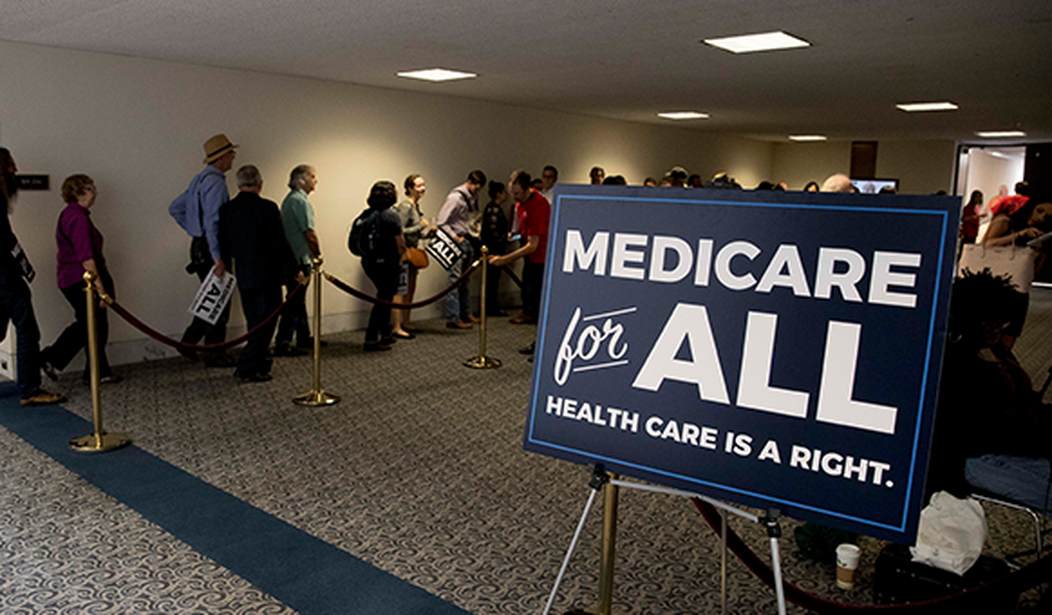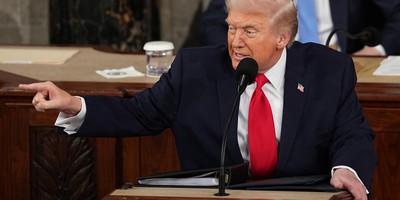The U.S. may be closer to a single-payer health care system now than it has ever been, with plans like Medicare for All reaching voter support levels not seen in years, and multiple leading Democratic candidates advocating for Medicare for All plans that would outlaw private insurance. To fight this rising tide, Republicans will need plans of their own - and a new plan out this week from Capitol Hill Republicans would be much better for patients and taxpayers than what Democrats are offering.
Perhaps a large part of rising support for Medicare for All schemes is a result of misconception. Sen. Bernie Sanders’ Medicare for All plan, which has been endorsed by Sens. Elizabeth Warren and Kamala Harris, is a single-payer plan that outlaws private insurance. However, polling shows that two-thirds of Medicare for All supporters (and 55 percent of people overall) believed they would be able to keep their current health insurance under a single-payer plan.
Single-payer opponents have done a thorough job making the case against Medicare for All - among the top arguments are that a single-payer plan will eliminate private insurance, lead to doctor shortages, have a severe impact on at-risk hospitals, and cost taxpayers tens of trillions of dollars in the first decade alone.
One reasonable question from Medicare for All supporters, and from folks on the sidelines, goes like this: ‘you’re opposed to Medicare for All, but what’s your plan to reduce health care costs for Americans?’ It’s fair to ask, especially at a time when cost is the top health care concern for voters. Supporters of a robust free market for health care are faced with particularly difficult questions, such as how to maintain a competitive system that lowers costs for patients and taxpayers while protecting society’s sickest and most vulnerable people.
Recommended
A major part of the answer is lowering regulatory barriers and introducing more competition to every part of the American health care system: insurers, hospitals, doctors, drugs, biological products, and more. Related, and equally as important, is allowing businesses to offer new, innovative products and services to health care consumers.
The new plan from the Republican Study Committee, out this week, goes a long way to achieving these results. How?
First and foremost, by making it easier for Americans to access and contribute to Health Savings Accounts (HSAs). These tax-advantaged savings plans can follow a person from job to job, making health insurance more portable than it is under a system led by employer-sponsored insurance. There are three major HSA reforms that the RSC plan makes that would be a great help for patients and taxpayers:
- De-linking HSAs from high-deductible health plans (HDHPs), so that more Americans are eligible to open an HSA; this would also make legal compliance with IRS rules for HSAs easier for both employers and individuals contributing to one.
- Allowing individuals to use HSA dollars to pay for premiums and over-the-counter (OTC) medications. Right now, HSA dollars can be used for certain qualified medical expenses, but not for premium payments or OTC medications. We believe HSA savers should be able to use their tax-advantaged dollars for both types of expenses, which almost all families face.
- Increasing the size of HSAs, by raising the contribution limits to $9,000 for individuals and $18,000 for families. In 2019, an individual can only contribute up to $3,500 to their HSA per year ($7,000 for family coverage). It makes little sense for this limit to be less than the out-of-pocket maximum the IRS allows for HSA-qualified insurance plans ($6,750 for individual coverage, $13,500 for family coverage). Lawmakers should close the gap, so that savers can cover their out-of-pocket maximum for a given year with HSA dollars.
The RSC plan also urges codification into law of some innovative insurance arrangements like association health plans (AHPs), short-term limited duration insurance (STLDI) plans, and health reimbursement arrangements (HRAs). None of these options are silver bullets in the effort to provide more affordable coverage to Americans, but they all present unique and tailored choices to individuals, families, and employers in certain scenarios.
Of course, the RSC plan is just the start of a broader conversation on health insurance. The conversation is ongoing, especially when it comes to how best to protect patients with pre-existing conditions.
But the RSC plan is a great start to articulating a response to Medicare for All that offers some distinct choices for voters. Medicare for All covers costs for some but will take away private insurance options and impose new and significant tax burdens on all. In contrast, the RSC proposal offers a new universe of unique plans tailored to patients and their families.
Andrew Lautz is a policy and government affairs associate with the National Taxpayers Union, a nonprofit dedicated to advocating for taxpayer interests at all levels of government.

























Join the conversation as a VIP Member